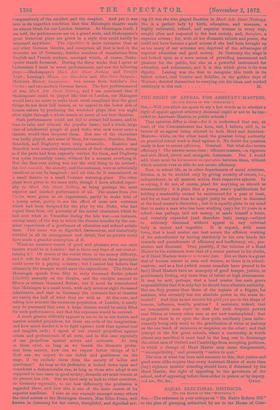THE RIGHT OF APPEAL FOR ASSISTANT-MASTER&
[TO THE EDITOR OF THE " SPECTATOR:1
you allow me space to say a few words as to whether a right of appeal against arbitrary dismissal ought or not to be con- ceded to Assistant-Masters in public schools ?
That opinions differ is clear—for it is understood that one, at least, of the Commissioners has been, and, I believe, still is, in favour of an appeal being allowed to both Head and Assistant- Masters—while, on the other hand, the greatest living authority on practical school work is dead against it. No doubt the question really is how to secure efficiency. Granted. But what does secure efficiency ? The answer seems clear ; efficient masters,—a vigorous and able Head, clever and energetic Assistants. But I would add, there must be harmonious co-operation between them, without- which masters ever so able do not secure efficiency.
Now, in school life, as in other departments of social relations,
friction is to be avoided only by giving security of tenure, i.e., independence, to all masters within their respective spheres. In so saying, I do not, of course, plead for anything so absurd as ; it is plain that a young man's qualifications for- holding a mastership cannot be ascertained for a year at least, and for at least that time he might justly be subject to dismissal at the head master's discretion ; but it is equally plain to my mind that to make a man who has been working (say) for 10 years in a school—has perhaps laid out money, or made himself a home, and certainly expended (and therefore lost) energy—subject to arbitrary dismissal without appeal to any external' body is unjust and impolitic. It is argued, with some force, that a head master can best secure the efficient working of his subordinates by having absolutely in his own hands the rewards and punishments of efficiency and inefficiency, viz., pro- motion and dismissal. True, possibly, if the relation of a Head. Master to his assistants were that of a senior partner to his clerks, or if Head Masters were ex vi termini just. But as there is a great deal of human nature in men and women, so there is in school- masters ; and as a fact (which recent scandals have proved to be fact) Head Masters have no monopoly of good temper, justice, or gentlemanly feeling, any more than of talent or high attainments. It may be said, perhaps, that a head master has such grave responsibilities that it is only fair he should have absolute authority. But are they greater than those of the captain of a frigate, for- instance, who certainly has not absolute power in the sense in- tended? And does he not receive his quid pro quo in the shape of honour, influence, wealth, position ? I maintain, indeed, that no honourable man ought to wish for such despotic powers over fifteen or twenty other men as are now contemplated ; that to grant them is to open the door quite needlessly (men unfor- tunately being only men) to the gratification of whim or jealousy on the one hand, of meanness or suspicion on the other ; and that (except in the few great schools, where a mastership is worth almost any sacrifice) it must tend in the long run to discourage the ablest men of Oxford and Cambridge from accepting positions,. in which a change of Head Master may mean disagreement, "incompatibility," and presently "notice to quit."
The sum of what has been said amounts to this, that justice and good-sense alike require that every Assistant-Master of more than (say) eighteen months' standing should have, if dismissed by the Head Master, the right of appealing to the governors of the school, and of appearing before them either in person or by deputy._


































 Previous page
Previous page